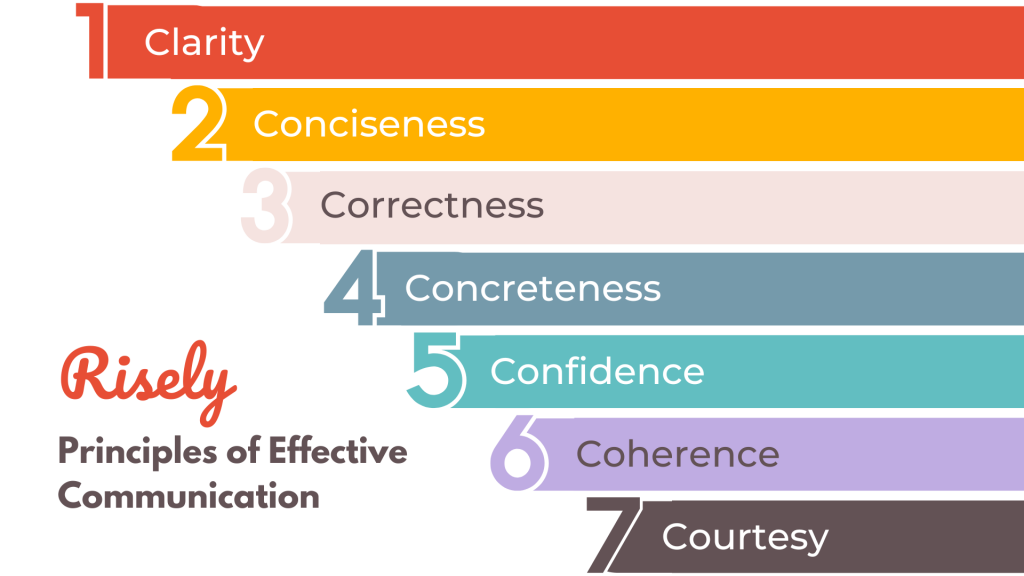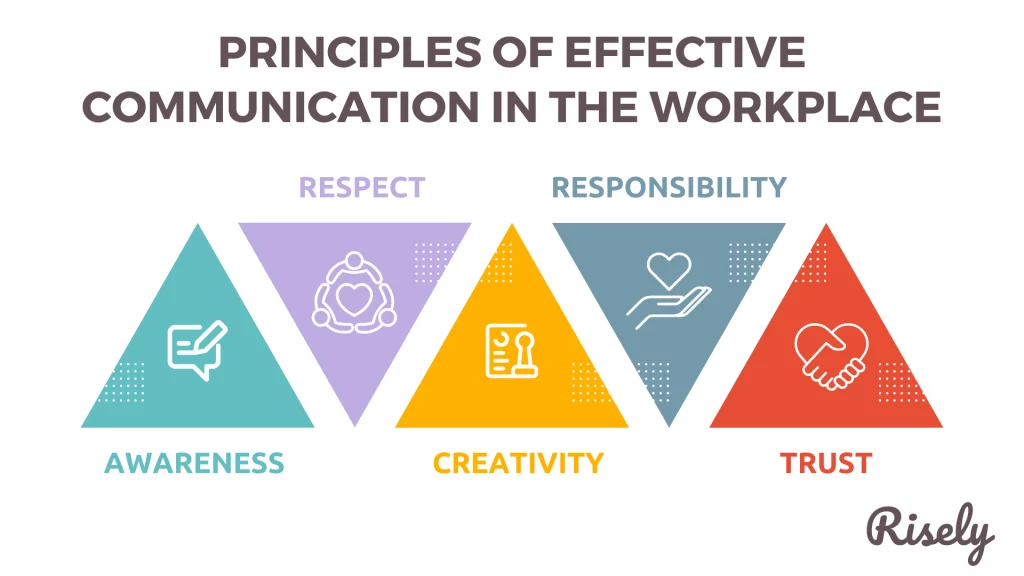7 Principles of Effective Communication in the Workplace
Communication often goes unnoticed. So often, we are sharing something without realizing it. Yet, some things remain constant. For instance, if your colleague approaches you to talk about work without knowing what they want, you would be annoyed quickly. But, if they can convey my thoughts simply and straightforwardly, it might go differently. That’s where effective communication comes in. It helps individuals connect and create mutual success. For professionals of the 21st century, it is among the most essential skills. But what are the principles of effective communication, and how can you use them to improve your dialogue with others? In this blog post, we’ll take a closer look at some of the critical principles of effective communication and discuss how effective communication consists of the 7 C’s and how to use them to improve your interactions with others. By the end of this post, you’ll better understand the principles of effective communication, and you’ll be well on your way to building stronger relationships and having more productive conversations.What is Effective Communication?
Communication – the human connection – is the key to personal and career success. Paul J MeyerAs Paul Meyer states, communication is the key to success in many areas. Effective communication, which refers to exchanging information, ideas, thoughts, and feelings in a way that is clear, concise, and well-received by the intended audience, is a standard that every professional aspires to achieve. It is a two-way process involving both the sender and the receiver of the message. The message needs to be accurately conveyed, understood, and interpreted by the receiver as intended by the sender. Conversely, ineffective communication that misses these areas leads to misunderstanding and disrupted coordination. Effective communication requires several skills, including active listening, clear and concise language, nonverbal communication, empathy, and adapting to different communication styles and contexts. It also requires you to be aware of your audience’s communication style and adjust your approach accordingly. For managers, effective communication is essential for building and maintaining relationships, achieving goals, and resolving conflicts. It is also vital to personal and professional success, enabling you to connect with others and convey ideas, thoughts, and feelings clearly and effectively. Read more: 5+ Effective Communication Examples For Managers
Why does Effective Communication Matter to Managers?
- Improved understanding and clarity: Effective communication ensures that everyone is on the same page and that there is no confusion about tasks, goals, or expectations.
- Increased productivity: Clear and efficient communication reduces wasted time and resources, resulting in increased productivity.
- Enhanced teamwork: Good communication promotes collaboration and cooperation among team members, leading to a more cohesive and effective team.
- Better decision-making: Effective communication enables individuals to share information, ideas, and perspectives, which leads to better and more informed decision making.
- Stronger relationships: Good communication helps to build trust and mutual understanding, which leads to stronger relationships between people in the organization.
What are the 7 Principles of Effective Communication?
Clarity
Clarity stands for the ability to communicate clearly and straightforwardly. This means using simple, direct language that is easy to understand. It ensures that the message is received accurately and that there is no confusion, ultimately enabling team transparency. Let’s understand with an example –Team manager John holds a meeting to discuss a new project:
Hi team, we are launching a new marketing campaign for the holiday season. Through this campaign, we want to focus on our young customers from the Gen Z and increase their presence by 10% over the next quarter. For this purpose, we will focus on an Instagram campaign and five live events. These tasks will be led by Anu and Manu, respectively.
Team manager Mark holds a meeting to discuss a new project:
Hi team, we are launching a new marketing campaign for the upcoming season. This campaign focuses on customer acquisition through novel engagement channels. Our team leaders will handle the process.
Coherence
Coherence refers to the ability to organize and present information in a logical and orderly manner. This means the message should be structured in a way that is easy to follow, and different parts of the message should be connected and make sense together. Coherence is crucial because it helps ensure the message is received and understood correctly. Let’s see an example –Team manager Sarah presents a quarterly performance report:
The marketing department led social media campaigns over the last quarter. We achieved 80% of our targets for Instagram performance by acquiring new followers and generating a quarterly high number of engagements. However, we can work more toward leading the users into our sales funnel more effectively.
Team manager David presents a quarterly performance report:
The marketing department focused on social media over the last quarter. We failed to achieve some of our targets. But we can add more interactive elements to our Instagram posts. Overall, it was a decent performance. We also reached our engagement goals.
Confidence
Confidence refers to the ability to communicate with assurance and conviction. This means speaking in a powerful, self-assured way that projects a sense of belief. Confidence is necessary because it helps to build trust and credibility with the audience. When a speaker is confident, the audience is more likely to believe and trust. Let’s note the difference with an example –Emily delivers a challenging presentation:
Good morning, everyone. The team has made significant progress over the past year. Let me walk you through the results, and I’m sure you’ll be as pleased as I am with what we’ve achieved. The positive impact on our business is evident; hence, the team seeks more support for our training initiatives.
In a similar presentation, manager Alex delivers the following message:
Good morning, everyone. Our efforts over the last year have been substantial. We’ve made some progress, and I hope it’s in the right direction. Our strategy seems to align with our goals, but I could be wrong. Feel free to ask questions.
Concrete
Concrete refers to the ability to communicate specific information and details rather than generalities or abstract concepts. This means providing clear examples, facts, and data to support the message. Concrete communication is essential because it helps the audience to understand and remember the message more efficiently. Let’s revisit this with an example –In a budget proposal, manager Lisa goes as follows:
We can cut down on our purchase of office supplies. My team has surveyed the members to conclude that reducing office supply expenses will result in 20% cost savings. We talked to everyone about the office supplies they typically use and their high openness to switching to sustainable alternatives.
Manager James offers the same suggestions differently:
We should adopt sustainable alternatives to office supplies. We can shift a lot of our work online. It will be easy, and people can learn the new methods soon enough. We could save some costs as well.
Correctness
Correctness refers to the accuracy and appropriateness of the language and information used in communication. This means using proper grammar, spelling, and punctuation and providing accurate and reliable information. Correctness is vital because it helps to build credibility and trust with the audience. Let’s catch up with an example –Daniel sent out the following email to share a financial report:
Please find attached the report, which summarizes our revenue, expenses, and profitability. All figures have been cross-referenced with our financial records. I have included references to our independent auditor’s recent report. If you have any questions or require additional information, please do not hesitate to reach out.
Meanwhile, James shares the same report as follows:
I’ve attached the quarterly financial report for the last three months. take a look when you have time.
Conciseness
Conciseness refers to the ability to communicate the message in as few words as possible without sacrificing clarity or completeness. This means being succinct and avoiding unnecessary information or repetition. Conciseness is essential because it helps to hold the audience’s attention and make the message more memorable. Let’s catch a weekly progress presentation to note the difference –Michael delivers a presentation as follows:
Good morning, team. Today, I’ll provide a quick update on our project’s progress. We’re on track, meeting our deadlines, and have secured a new client. The critical action items are to finalize the budget and schedule a client meeting next week.
Sophia takes over in this manner:
Good morning, everyone. I’d like to start by reviewing the project’s history, how it was initiated, and the challenges we faced. Then, we’ll delve into a detailed breakdown of our current activities. Then, we’ll move on to the strategies we considered for overcoming those challenges. And finally, we’ll wrap up by discussing our recent successes and plans for the next few months.
Courtesy
Courtesy refers to the ability to communicate politely and respectfully. This means using appropriate language, tone, and nonverbal cues and considering the audience’s perspective and needs. Courtesy is essential because it helps to create positive relationships and foster a respectful and professional environment. Let’s understand the difference with an example of constructive feedback –Manager Chris delivers constructive feedback in a 1-1:
Hi Emily, I have noticed that you have missed several deadlines lately. How is everything going? Are you facing some challenges? Is there any way I can help? I can share a few time management strategies that have helped me earlier.
On the other hand, manager Linda discusses this in a group meeting:
Emily, you have missed deadlines for a couple of weeks consistently. This is not how this team works. It is causing issues for everyone. It’s frustrating and unprofessional; you need to get your act together.

How to use the Principles of Effective Communication in the Workplace?
Together, effective communication consists of these 7 C’s help to create a clear, accurate, concise, and courteous message that is more likely to be received and understood correctly by the audience. Here is an example to show how good managers use the principles of effective communication at work: During a team meeting to discuss a new project, the manager, Sarah, communicates the objectives and expectations with remarkable effectiveness.- Clarity: Sarah starts by clearly outlining the project’s goals and how it aligns with the team’s overall vision.
- Coherence: She presents a well-structured plan, breaking down the tasks and timelines in a logical sequence.
- Confidence: Sarah exudes confidence in her approach, ensuring the team feels assured about their roles and responsibilities.
- Concreteness: She provides specific examples of successful past projects to demonstrate the potential impact and results.
- Correctness: Sarah double-checks her facts and data, ensuring that all the information she shares is accurate and up-to-date.
- Conciseness: She avoids unnecessary jargon and lengthy explanations, conveying the key points succinctly.
- Courtesy: Throughout the meeting, Sarah listens actively to her team’s input, appreciates their ideas, and addresses any concerns with respect and empathy.
Principles of Effective Communication in the Workplace
The principles of effective communication include:- Awareness: Communication begins with self-awareness. To be an effective communicator, you need to be aware of your thoughts, feelings, and behaviors and understand how they may impact how you communicate. Awareness of your communication style, strengths, and weaknesses can help you adapt and improve your communication with others.
- Responsibility: Responsibility is an important principle of effective communication. Effective communication requires taking responsibility for your message and the way it is received. This means being mindful of the words you use, the tone of your voice, and your nonverbal cues and ensuring that your message is clear, concise, and appropriate for the audience. It also means being willing to take responsibility for any misunderstandings or miscommunications.
- Respect: Respect is a fundamental principle of effective communication. This means treating others with dignity and courtesy and being mindful of their feelings and perspectives. It also means being open-minded and willing to consider different viewpoints and being willing to compromise and find common ground.
- Trust: Trust is a key principle of effective communication. It means being honest and transparent in your communication and building mutual trust and respect with your audience. Building trust is essential because it allows individuals to be more open and honest in their communication, leading to more effective problem-solving and decision-making.
- Creativity: Creativity is another essential principle of effective communication. It means being open to new ideas, thinking outside the box, and being willing to take risks. Creativity allows individuals to come up with new and innovative solutions to problems and communicate in engaging and memorable ways. This can be beneficial in marketing, advertising, or public speaking situations.

Conclusion
To sum up, effective communication can make a huge impact in the personal and professional spheres of our lives. The principles of effective communication are important guiding mechanisms in this process. They help us understand how to communicate well. By understanding and applying the principles of effective communication, we can improve our interactions with others, build stronger relationships, and have more productive conversations.Are your communication skills in line with the principles?
Test now with the free communication skills self-assessment for managers and find areas to improve
Principles of Effective Communication FAQs
What are the 5 principles of effective communication?
Which principle of effective communication relates to making sure your message is clear and understood by the audience?
How important are the principles of communication?
What is the importance of principles of effective communication in management?
Other Related Blogs


